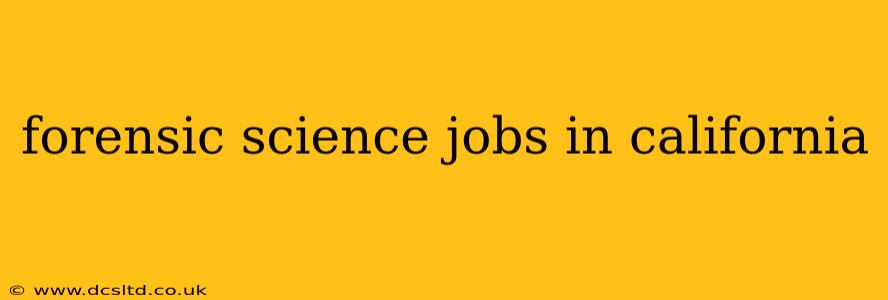California, with its large population and diverse range of law enforcement agencies, offers a wealth of opportunities for those interested in forensic science careers. This guide explores various forensic science jobs available in California, the educational requirements, salary expectations, and the competitive landscape. We'll also address frequently asked questions to give you a comprehensive overview of this exciting field.
What are the different types of forensic science jobs in California?
California's forensic science landscape is broad, encompassing various specializations. Some of the most common job titles include:
-
Forensic Scientists: This broad category covers professionals analyzing evidence in various disciplines, such as DNA analysis, toxicology, trace evidence examination (hair, fibers, etc.), ballistics, and digital forensics. They typically work in crime labs, either at the state or local level.
-
Crime Scene Investigators (CSIs): CSIs are responsible for securing and processing crime scenes, collecting evidence, and documenting their findings. Their work is crucial in the initial stages of an investigation.
-
Forensic Pathologists: These medical professionals perform autopsies to determine the cause and manner of death. Their expertise is critical in homicide investigations.
-
Forensic Anthropologists: Specializing in skeletal remains, forensic anthropologists assist in identifying victims and reconstructing events surrounding death.
-
Forensic Odontologists (Forensic Dentists): These dentists use dental records to identify victims, often in cases where bodies are severely decomposed or damaged.
-
Digital Forensics Analysts: With the increasing reliance on technology, digital forensics analysts play a critical role in investigating cybercrimes and retrieving data from electronic devices.
What are the educational requirements for forensic science jobs in California?
Educational requirements vary depending on the specific job. Most positions require at least a bachelor's degree in a relevant field, such as forensic science, biology, chemistry, or criminal justice. For some specialized roles, like forensic pathologist, a medical degree (MD) is necessary, followed by extensive training. A master's degree or PhD can significantly enhance career prospects and open doors to advanced positions and research opportunities. Many positions also benefit from relevant certifications and professional affiliations.
What is the salary range for forensic science jobs in California?
Salaries in forensic science vary depending on factors like experience, education, location, and employer (state, local, or private). Entry-level positions may start around $50,000-$70,000 annually, while experienced professionals can earn significantly more, potentially exceeding $100,000 per year. Specialized roles like forensic pathologists typically command higher salaries.
How competitive is the job market for forensic science in California?
The job market for forensic science in California is competitive, particularly for entry-level positions. A strong academic record, relevant experience (internships, volunteer work), and certifications can significantly improve your chances. Networking within the field is also beneficial.
What are the career advancement opportunities in forensic science in California?
Career advancement opportunities are available in several forms:
- Increased responsibility within the same agency: Progression to senior forensic scientist, supervisor, or management roles.
- Specialization in a niche area: Focusing on a specific field like DNA analysis or digital forensics to become a leading expert.
- Moving to a different agency: Seeking positions with larger agencies or those offering more advanced opportunities.
- Academia: Pursuing a doctoral degree and entering academia as a researcher or educator.
What skills are important for a forensic science career in California?
Beyond technical skills, successful forensic scientists in California possess:
- Strong analytical and problem-solving skills: Essential for analyzing complex evidence and drawing accurate conclusions.
- Meticulous attention to detail: Accuracy is paramount in forensic science.
- Excellent communication skills: Clearly articulating findings in reports and court testimony is crucial.
- Ability to work independently and as part of a team: Many cases involve collaboration across various disciplines.
- Resilience and ability to handle stress: Dealing with sensitive cases and high-pressure situations is part of the job.
Are there private forensic science labs in California?
Yes, California has several private forensic science labs that offer services to law enforcement agencies, attorneys, and other clients. These labs typically focus on specific areas, such as DNA testing or toxicology.
This comprehensive overview should provide a strong foundation for anyone considering a forensic science career in California. Remember that thorough research into specific job postings and relevant educational pathways is vital for navigating this competitive yet rewarding field.
